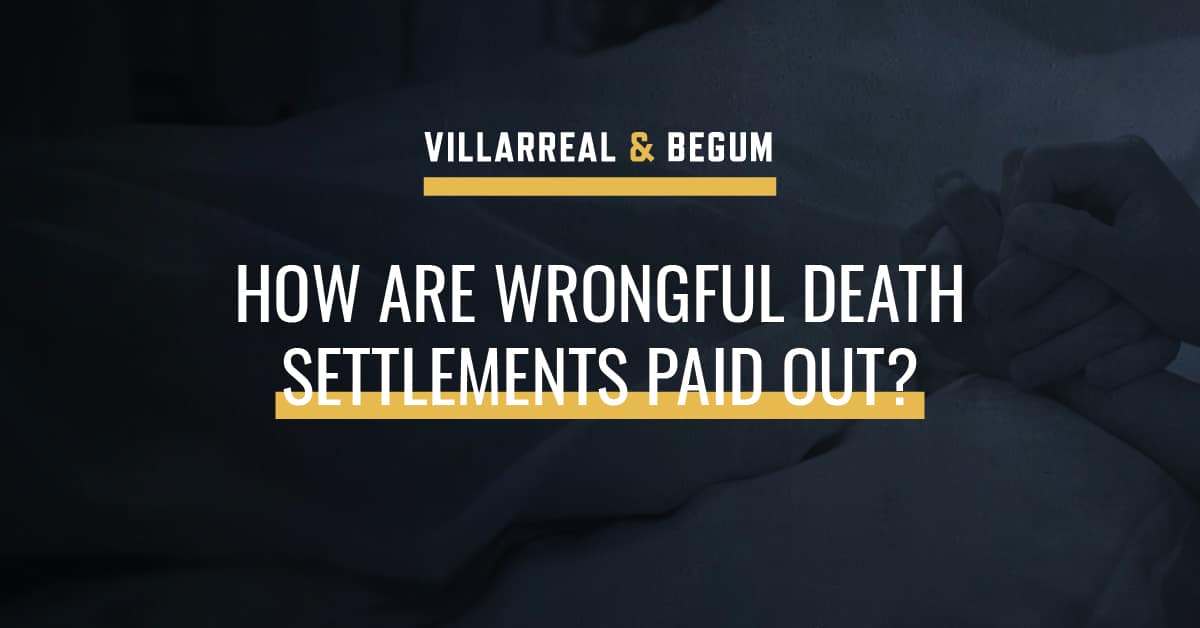There is nothing more devastating than losing a loved one. If someone else’s negligence or carelessness caused your loss, then you are entitled to seek compensation. While no amount of money can ease the pain you’re experiencing, a wrongful death lawsuit can help you recover the damages you need to support your financial security and give your family closure.
At the Villarreal & Begum, LAW GUNS, we have helped many Texas families achieve justice from negligent parties and get the compensation they deserve for their losses. One of the questions we often receive is “How are wrongful death settlements paid out?” In this blog, we answer that question and provide some clarity into the process, including who is eligible to file under Texas law and what damages you could potentially receive in a successful lawsuit.
What Is a Wrongful Death Settlement?
A wrongful death settlement refers to the amount that the negligent party or their insurer agrees to pay to settle your wrongful death claim. Depending on the circumstances of the fatal accident, you may receive compensatory damages like the following:
- Medical bills incurred while your deceased loved one was being treated
- Lost wages that they could have provided in the future as well as those incurred while they were receiving medical care after the accident
- Loss of inheritance
- Funeral and burial expenses
You and your family may also receive compensatory damages for the physical, mental, and emotional trauma that you and your loved one experienced due to the fatal accident. If the responsible party was especially reckless or negligent (e.g. a drunk driver), you may be able to recover punitive damages as well.
Contact A San Antonio Wrongful Death Lawyer Today
Facing the loss of a loved one due to negligence or misconduct is devastating. Our compassionate team of lawyers is here to offer support and legal guidance during this difficult time.

Who Can File a Wrongful Death Claim in Texas?
Texas law allows the spouse, children, or parents of the deceased to file a wrongful death lawsuit. Children must be legal adults, and they must be the decedent’s legal children. This means that someone who has been adopted cannot file a claim on behalf of a biological parent who has died. For parents filing on behalf of deceased children, the same applies: unless the child was legally recognized as theirs, they cannot sue.
In the event that none of these parties brings a lawsuit within three months of the death, the deceased’s estate or a personal representative can file a lawsuit on behalf of the estate. A personal representative is a person in charge of the deceased’s affairs. Depending on the circumstances, it can be an executor or administrator.
What Is the Average Wrongful Death Settlement in Texas?
Every wrongful death lawsuit is unique because no two accidents are exactly alike, and each victim has a personal and financial background that can impact the claim. Factors that are commonly taken into consideration include:
- The age of the decedent
- Their future earning potential
- Medical bills and other health care costs incurred by the decedent as a result of their injury
- Available insurance policy coverage and limits
Insurance companies must consider that wrongful death claims aim to provide for the decedent’s loved ones for as long as he or she would have done so had they lived a full life. Depending on their personal income, settlement amounts can range from thousands to several million dollars. Your Texas wrongful death lawyer will work with financial and medical experts to come up with a settlement demand that addresses these conditions.
Payment of Wrongful Death Settlements
A wrongful death settlement can be paid to you in one of two ways: in a lump sum or via structured payments. How your settlement is paid depends on who is responsible for paying it: it is easier for an insurance company with a lot of financial resources to make a lump sum payment than an individual who needs time to accumulate funds for the settlement.
Lump Sum Payments
When a settlement is paid in a lump sum, the at-fault party or their insurer pays the full amount at once. Once the case has been settled, they may even cut a check to the plaintiffs or their personal representatives.
One of the biggest advantages of lump sum settlements is that you can repay debts accrued during negotiation. These obligations, which can be quite substantial, include medical bills, funeral and burial costs, and legal fees for your wrongful death lawyer. Other advantages include:
- If your loved one was your primary source of financial support, you probably have a lot of consumer debts to pay, such as a mortgage or credit card bills. Getting the settlement upfront will allow you to pay off the debt before it accrues too much interest.
- In contrast to structured settlements, getting the settlement upfront eliminates any potential problems of nonpayment.
Structured Settlements
Structured settlements allow defendants to pay in smaller installments over time. Typically, these installments are made every month, but the parties can make another arrangement that fits their needs. This is a very difficult arrangement to change once it has been made.
One of the most significant benefits of a structured settlement is that it provides long-term financial stability for the surviving family members of the victim. In situations where the deceased person was your family’s only income source, this can be especially important. Structured settlements serve as a reliable revenue stream for long enough for you to find other means of making ends meet.
One potential drawback to structured settlements is that they are paid out over the course of many years, so there is a risk of nonpayment at some point. However, the settlement agreement can be drafted to include certain protections that can mitigate this risk.
Are Wrongful Death Settlements Taxed?
It depends. While the IRS typically doesn’t tax compensatory damages in wrongful death settlements, certain portions may be taxed. A settlement awarded to the estate of a deceased person, for example, may be taxed through probate. In addition, if your wrongful death settlement includes punitive damages, they can be taxed by the IRS as ‘other income.’
Can a Car Accident Result in a Wrongful Death Case?
Curious about the legal implications of a car accident resulting in a wrongful death? Explore the possibilities and learn about your rights and options in such unfortunate circumstances.

How Are Wrongful Death Settlements Distributed?
There may be more than one beneficiary of a wrongful death settlement, and how the settlement is distributed depends on the parties involved. For example:
- Due to the nature of their relationship, surviving spouses are likely to receive more than children.
- In wrongful death cases, children under the age of 18 are not legally allowed to inherit or receive compensation, so a trust must be created to oversee the settlement until the child is 18. A trust may also be required to manage the compensation of an incapacitated adult.
In a lot of cases, money owed to healthcare providers like hospitals is paid out before the remaining settlement is distributed to eligible family members. By hiring a wrongful death lawyer, you can make sure that your interests are represented and that you receive a fair settlement amount.
Get a Free Consultation With a Texas Wrongful Death Lawyer
When you’ve lost a loved one as a result of another’s negligence, an experienced personal injury attorney in Austin can help alleviate the burden associated with facing the legal system alone. At the Villarreal & Begum, LAW GUNS, we can handle all negotiations with the insurer and manage your case while you focus on healing. We work on a contingency fee basis, which means you don’t pay us until we win compensation for you. To schedule a free consultation, please contact us today.
The Villarreal & Begum, LAW GUNS dedicates their time and effort towards helping people in Texas find justice for personal negligence encountered while living their normal, everyday lives.




